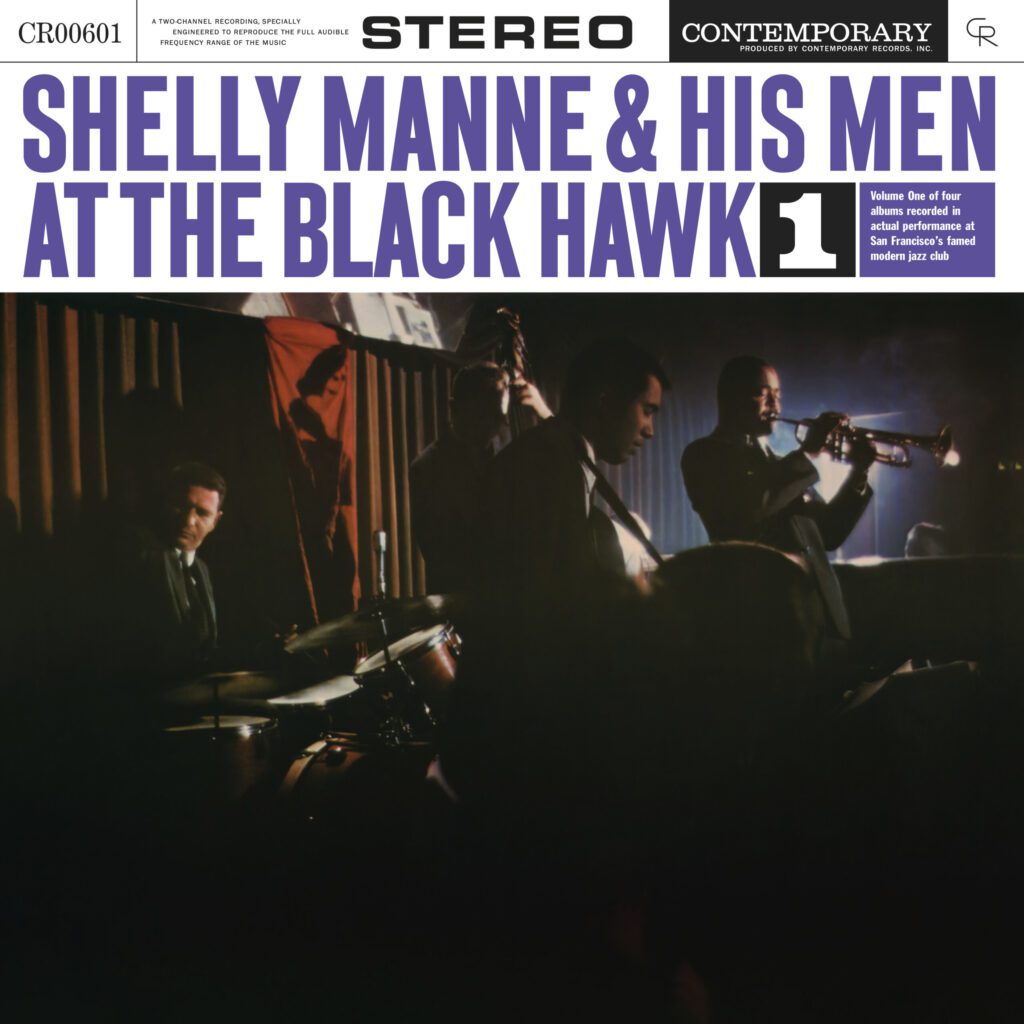Although he’s noted for extensive and diverse credits as a sideman and as a contributor to countless scores for television and film, drummer Shelly Manne remains best known as a leader, and particularly for a string of albums beginning in the early 1950s piloting Shelly Manne & His Men. This includes four LPs released together in 1960 that document a live stand at San Francisco’s Black Hawk club from September of the previous year. At the Black Hawk, Vol. 1 is reissued March 15 on 180 gram vinyl as part of Craft Recordings year-long series reissuing select titles from the catalog of Contemporary Records.
Make no mistake; in terms of numbers, Shelly Manne’s discography is a massive achievement, and that’s excluding sideman credits and soundtrack contributions. When a body of work grows to that size, obviously there’s a much smaller percentage gathering the essentials plus some additional higher quality work. For Shelly Manne, the four At the Black Hawk, Vol. 1 sets belong to that category. This first volume is a sensible place to begin investigating Manne’s work, but it also serves to expand West Coast jazz of the 1950s beyond the stereotype.
First, the band; there’s Joe Gordon on trumpet, Richie Kamuca on tenor sax, Victor Feldman on piano, and Monty Budwig on bass. This isn’t the highest-profile lineup of the Men, as prior iterations featured altoists Art Pepper, Bud Shank, and Charlie Mariano, along with Jimmy Giuffre on baritone sax, but the playing is consistently strong and the atmosphere across At the Black Hawk, Vol. 1 never falters.
And the ambience is a big part of this record’s appeal. High quality recorded documentation of robust jazz captured in a nightclub that catered to exactly that sort of thing just wasn’t that common in the retail bins during this era, so when Contemporary dished out all four volumes in 1960, interested parties could gather some insight into how a working band operated across numerous sets and nights during a club engagement.
But At the Black Hawk, Vol. 1 still shines when considered singly, in part due to how the band spreads out on the material. There’s two pieces a side, plus the brief set-closing theme “A Gem From Tiffany.” The opening version of the Gershwin-Hayward standard “Summertime” is an immediate attention grabber, with Gordon’s muted trumpet enhancing the slow-build humidity.
Kamuca’s tenor is authoritative but appropriately smoldering and then Feldman hits a mid-point between sophistication and the tune’s essential bluesy flavor. Budwig’s foundation is large but calm (heard first, alone) as Manne accents and adds rhythmic depth, but subtly; absorbed without context, one would have no idea the drummer was leading the band.
Tadd Dameron’s “Our Delight” kicks the set into high bop gear, as this cooker’s vibe is decidedly more East Coast in nature (Manne was born in New York City and established himself as a player there before moving to Los Angeles). And it’s further notable that when it’s Manne’s time in the spotlight, he shares it with Budwig, the pair expressively spurring the momentum.
Over on the flip, “Poinciana” is another up-tempo take on a standard that blurs the coastal distinctions. It’s really the final track, a version of trombonist and former Manne bandmate Frank Rosolino’s “Blue Daniel,” that situates the somewhat Shorty Rogers-esque number as a byproduct of sunny California. At the Black Hawk, Vol. 1 grows in stature when absorbed alongside its companion volumes, but lively and versatile, this kickoff set holds up well on its own.
GRADED ON A CURVE:
A
